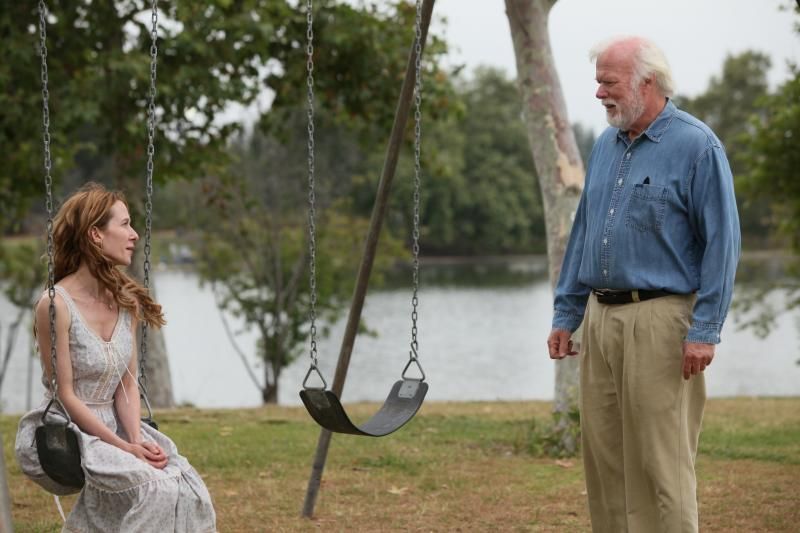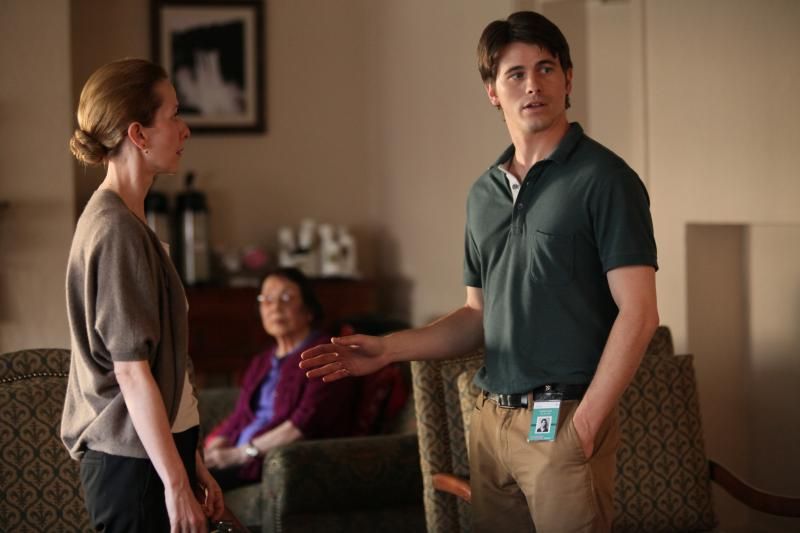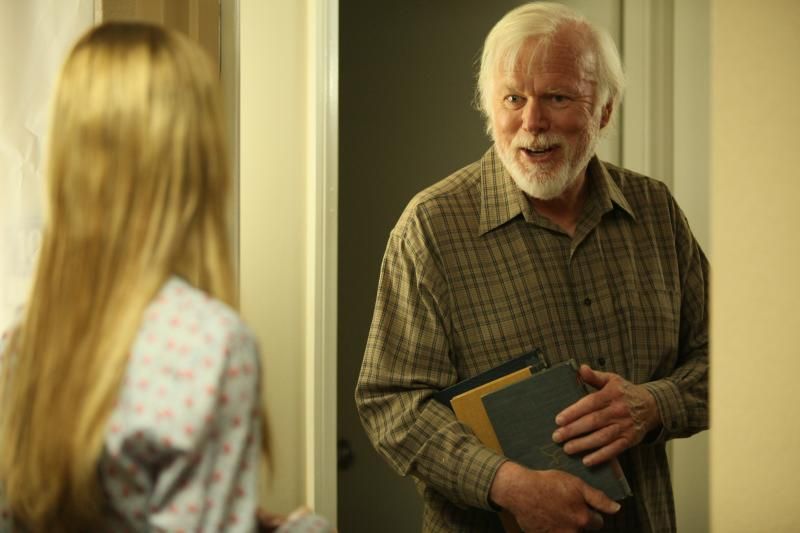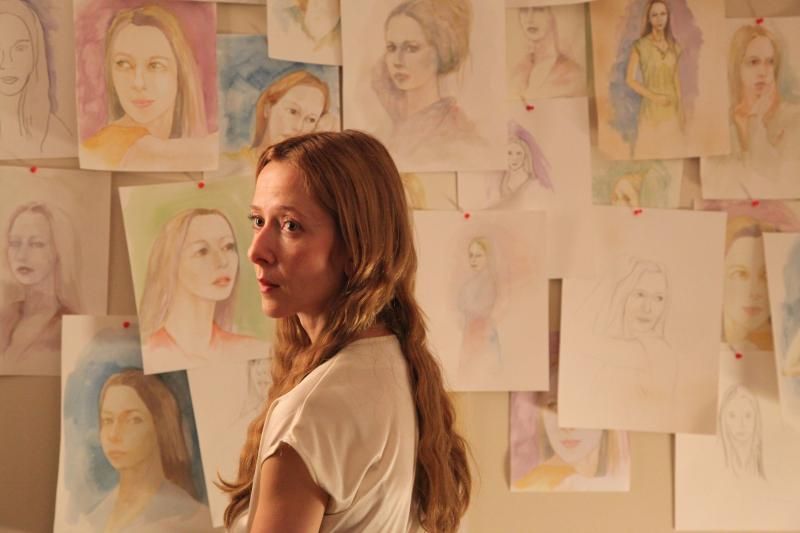Fans of The Big Bang Theory know that Simon Helberg’s relationship-challenged character Howard Wolowitz definitely married well when he tied the knot with Bernadette, and they may be pleased to learn that off-screen Helberg didn’t do too shabby either: Since 2007 he’s been married to actress Jocelyn Towne, daughter of screenwriter Roger Towne (The Natural) and niece of legendary writer/director Robert Towne (Chinatown), and now a filmmaker in her own right with the indie drama I Am I, which she wrote, produced in starred in.
Making I Am I was a labor of love for Towne and Helberg, who worked tirelessly to tell the somewhat unorthodox but decidedly moving story. Upon the death of her mother, Towne’s character Rachel is unexpectedly reunited with her troubled, long-absent birth father Gene (Kevin Tighe). However, her desire to question and possibly connect with him is complicated by the discovery that age and psychological difficulties have left him believing he’s still only 35 – and worse, Gene perceives Rachel as her late mother and his long-lost love. Despite the concerns of Gene’s devoted caretaker Jonathan (Jason Ritter), Rachel indulges Gene’s faulty vision, hoping to uncover the secrets that created the foundation of her life, at the risk of complicating it even further.
In a bid to see through their vision for the film, the couple dipped their creative toes into crowd-funding just as the concept was taking off: Towne and Helberg, who appears in a supporting role and serves as a producer on the film, turned to the sitcom star’s wide-ranging fan base for support and were stunned to see how quickly the project was able to secure funding. I Am I has since garnered positive film festival buzz, along with earning an Outstanding Achievement in Directing Award at the Newport Beach Film Festival.
The couple joined Spinoff Online for an exclusive conversation to discuss getting the film made, how it affected their personal dynamic, and their next professional collaboration We’ll Never Have Paris, which they’re co-directing from Helberg’s semi-autobiographical, serio-comic script about a tumultuous period early in their relationship.
Spinoff Online: I'm curious where this germ of an idea for this story came from? What sparked the inspiration, and what moved to you to see it through and get it made?
Jocelyn Towne: Well, I came up with the idea. I was inspired by – my dad used to play me records from The Man of La Mancha, the music from it, and one of the songs, “I Am I, Don Quixote,” that's where the title comes from. So I took the idea of this character, and I wanted to modernize him and made him into a war veteran who could not see the world as it was. And I reimagined Aldonza/Dulcinea as, instead, his daughter, who he thought was his wife, and then Sancho Panza as his nurse/caretaker. And that's where it came from. And I think I just loved the idea of Don Quixote was this idealist, but then I kind of wanted to play with that whether or not it was about someone who was in deep denial of the things in his life that had gone wrong or if it was possibly a condition that he had. So that's sort of what got me interested in telling the story and then it just kept getting deeper and deeper as I worked on it, as hard as it was to flesh out the characters and the original idea. But it look on a life of its own, and I kept on working on it until I got a draft I was happy with.
And for you, Simon, to watch Jocelyn take on this monumental journey, was it a challenge to figure out how to best support her – besides showing up to act in the movie?
Simon Helberg: Yeah, it was – we raised the money through Kickstarter, and I was skeptical of that – I was trying to be supportive, but I didn't understand. Crowdfunding was a word I had never heard, and most people at that time, hadn't. Kickstarter was pretty new at the time that we set out to raise the money, but then even getting to that point, I was a huge supporter of the movie. Once we kind of turned to Kickstarter, I thought, “Oh no – is this, like, a Hail Mary? What are the odds that people are just going to donate to a movie? And then I send them a voice message, or we send them a T shirt, or whatever it is? How does this work?” And then Jocelyn made an incredible, funny, smart video to promote the movie and to try to get people to donate, and it kind of created this tidal wave of support and I was blown away by that. And to just all of a sudden have the ability to make this movie was like – we already knew we already had these thousands of fans and supporters. So yeah, I was always was a huge fan of the script, but it's a battle getting things made. With Jocelyn, I felt in very good hands, and throughout the process, too, I was very inspired by the way she brought it to life.
How easily were you able to navigate all the different roles that you took on for this project? Was it complicated to be the leading lady and the director and writer, or did it flow organically for you?
Towne: In some ways, it was complicated, but in other ways, I had so much time. I mean, it took years to get this made, and I had so much time to think about how I would like to do it, and so knowing that I was going to be wearing so many hats, I worked on my lines as the actor and the character for months – starting a year before. Just because I never knew when we were going to have the funding. So I worked on it with a coach. I watched myself. I would videotape the sessions. We would get together and have fellow actors read the script with us. And then, as the director, because I'd never done that before, I just sat down and started reading books on directing: “Here, I'll take a look at this.” And I interviewed directors and asked them what their first time directing experience was like. And then, before I got on set, I was terrified of directing other actors because I've never done it. I imagined how intimidated I would be to direct other actors. And then, once I was there, all the fear was gone. There was either no time for it, or it just felt natural and everybody was such a good team player, that I didn't have any need to fear. But it was difficult in the sense that there was no time to watch playback, so I had to depend on Simon and our producers to be the eyes for me because I couldn't waste precious time by going back and looking at takes. That part was definitely challenging, but it was great being the writer because I could just sit there and change lines if I wanted to. Didn't have to worry about that.
What did you discover about each other, working this way together?
Towne: Well, I learned how supportive Simon was, of me, as an artist. I mean, in some ways it's easy to – or maybe it's not easy – just be verbally supportive of someone, but to have him be wholeheartedly, passionately there for me during the entire filming of it and become so emotionally involved in it himself was really something that I didn't expect and didn't know that he would be there in that way for me. So that was a really wonderful surprise and gift.
Helberg: Yeah, I learned how wonderful I am [laughs]. No – I learned that Jocelyn was able to actually run a set and be strong-willed and also compassionate and able to answer every single question under the sun, which sort of happens when you direct a movie. And it's not that I didn't know that she was a very strong person, but I think it was a surprise to see that kind of authority coming from her because she's just a – in life, I guess it's a good thing that she's not always telling me where to stand and how to speak! But no, it just requires, like when I say, “What shall we order for dinner?” It's like a 45-minute conversation of like, “Oh, well, God. I don't know … Last time the dumplings weren't as good, and it takes a long time, and there's so much gluten in that, and I need protein ...” And it's like, “Oh, my God, what's going to happen when an actor says ‘Do you think I should exit camera left or camera right?’” It's like, “Well, let's see... hold on, if we think about camera left.” But she was like, “Nope – you've got to do this, and this is the story we're telling and how we're going to do it.” Also very collaborative, so it was really cool. I think I'm a very indecisive person a lot of the time, but I think when it comes to work or having a vision of something, I take on a different role as well, because I know what I want usually, to do, and so does she. But Chinese food is still a disaster to order.
Towne: Yeah, don't ask us about Chinese food! [laughs]
Now that you're both equally calling the shots as co-directors of We’ll Never Have Paris, is that working out pretty well?
Towne: Yeah. I mean it was challenging, but in some ways – Simon wrote the script for the new one, and I think in that sense, I say that it's his baby because he created that part of it. So I have to defer to him as the writer, and I ask him those questions. What was your intention here because we really respect story. So even though it's our story, we fictionalized it. He fictionalized it. He's telling it from his perspective. It's not my perspective completely. It's not how I would have written it. I love what he wrote, and I would never have been able to write it. But in that way, if we're going to, like, arm-wrestle it, I'll let him win the battle most of the time on that one. Not always.
Except for when he's wrong.
Towne: Except for when he's wrong, and then I must tell him that he is wrong. [laughs]
Helberg: Every other time I'm right, so I'm only wrong when I'm wrong.
Tell me about your leading man, Kevin Tighe, a veteran actor with a zillion credits, from Emergency on to Lost and Salem. I'm sure he was thrilled to get such an extraordinarily juicy part. Tell me about watching him in action.
Towne: It was really just this huge stroke of luck that we ended up getting to work with Kevin, because he came onto the project last-minute. He was in Hawaii on an anniversary trip with his wife when we sent him the script and he agreed to do it, we didn't have any time to rehearse. I had seen him in a play – that's how I knew his work; I had not seen him as an actor in other projects before that. I happened to see him in this play he was fantastic in, and his manager happened to be Jason Ritter's manager, and that's how she mentioned him. It was just very serendipitous, but he walked on with so much thought – he put so much work into the part in the short time that he had to do it, that he walked on and the first day, I was relieved and inspired by the choice he was making, the passion he was bringing into it. And when we didn't agree on something, we would discuss it. He would offer up ideas. Sometimes I would think it was great. Sometimes I didn't think it worked for the story, and he always trusted me to try what I was asking for which was something I was nervous about whether or not this veteran actor would listen to a first-time director and give me the benefit of the doubt and he did. Every time.
Simon, now that you created a character like Wolowitz, who viewers have embraced and is part of the fabric of television, how did it feel to be able to branch out and flex other creative muscles, to show that as an actor there are others things you can be equally good at?
Helberg: Well, thank you. I think everyone from the show, and I think most shows, come into it as they're actors: If you're just an actor, you're an actor for hire. And you've probably done other things, and you hope you will do things after the show. So I think there is just this thing that I guess … not a pigeonholing – but there can be – but there are these preconceptions that you are this person. And I guess I don't see myself that way. So for me, this was just an exciting opportunity to tell a great story. Obviously, there is the benefit of showing different colors. And as an actor, the role in this movie was a minor role – not necessarily a minor character, but it was a smaller part and kind of helped with certain exposition. And it wasn't the meatiest role in the world, but it was a wonderful simple, sweet, character. And I enjoyed getting to do something slightly more subtle than I do on TV, and I really enjoyed mostly producing it and being in the editing room and getting to tell a completely touching, deep, beautiful story that Jocelyn wrote – and of course, getting to do our next movie. Playing different roles is something that you get hungry to change it up a bit, because you do the same character for years and years, which is a fortunate position to be in, but you can get a little antsy to flex different muscles, so it was nice.
Did she make you audition?
Towne: Several times.
Helberg: She did. She called me back a few times and hired me, fired me, but I lobbied.
Tell me about your next project together: taking a version of your own personal love story – you nearly didn’t end up together – and putting it out there for public consumption. What's been the experience doing that? Was it hard, or surprisingly easy?
Helberg: It's hard for many reasons, but one of them being that it is so personal. That just adds to the already almost insurmountable task of just getting a movie made and getting people attached and getting the money and doing it – I mean, we had to move to New York, and we didn't know if it was going to happen. It was just this leap of faith, and that, in and of itself was incredibly –
Towne: It was an insane amount of work.
Helberg: It was exhausting.
Towne: It was 24/7. Talk about taking your work home with you. It never ended. It was definitely the most stressful thing we've ever done.
Helberg: Yeah, because it all comes back to us, especially because it's based on our story. That you're never not at fault: if the joke doesn't work, well, I wrote it; and if the moment feels false, well, I may have lived that; and if the craft service is bad, it's like, well, I guess we hired those people. It's a lot to walk around with for months and months – years – to have that pressure on your shoulders like that.
Towne: But in terms of the story, it was definitely difficult when I found out that Simon wanted to write it and tell that story, I did not see how it was going to be funny or enjoyable in any way. And then I read the script and thought it was hilarious. And yeah, it was difficult to, I think, at first get through seeing these parts of our life pulled up, but then, it became sort of cathartic to reimagine it and fictionalize it in certain ways and work on it together, so that it became actually fun. But I think fun is a retrospective in hindsight word because it was so stressful [laughs]. And we didn't find that much fun while we were doing it. It really was just a very stressful event. I'm definitely happy that we did it.
Helberg: Yeah, blood sweat and tears, and to actually live those moments and to make it, so I guess it all lined up nicely.
And good for you as a couple in the end?
Towne: Yeah.
Helberg: Yeah, yeah. I think it was a major – I think maybe we exorcised certain demons.
Towne: I think we had to really truly learn how to work together in a way that on I Am I we weren't confronted with because I was ultimately the head honcho on that one. And this one because we were sharing it, we really, truly had to face, “How do I talk to you in the best way possible that we don't start a fight over something? How do we really listen to each other and respect each other's work or respect each other's ideas even if we're tired and aggravated and feeling immense pressure from this side or that side?” And that was definitely something that took us time to find our footing, but I think by the end of post, we may have finally gotten our ...
Helberg: There's something invigorating about putting your guts out there, so the vulnerability, I think, it's like an aphrodisiac. It's like go big or go home, I guess. It's a lot of me on screen, and a lot of our experiences in there, and a lot our vision all over it and weird things – vulnerable and sexy and funny and sad and tragic. And there's no way to hide. So I guess that's a turn on, and maybe we're sadomasochists, not just masochists.
Playing now in select theaters, I Am I is also available on iTunes and On Demand.





